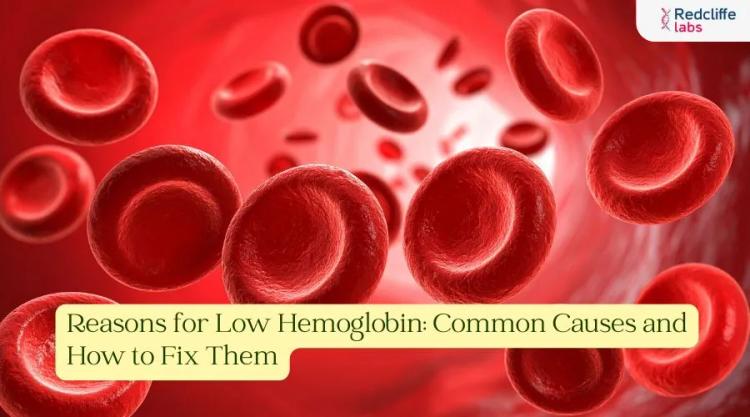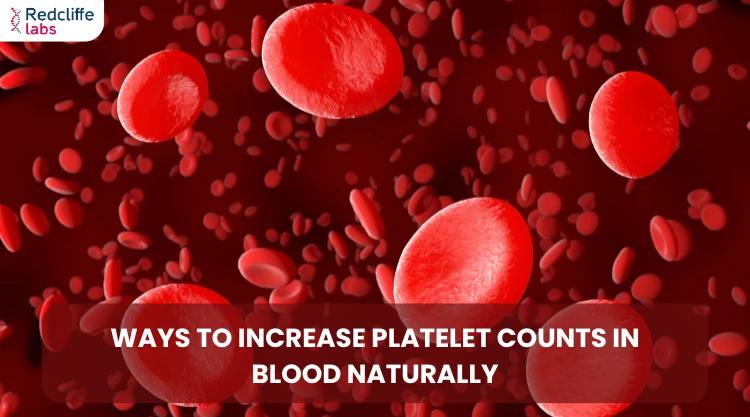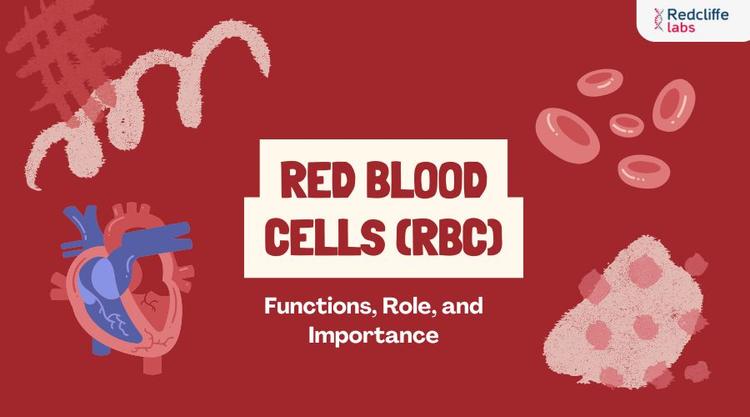How to Increase RBC Count Naturally?

Medically Reviewed By
Prof. Ashok Rattan
Written By Muskan Taneja
on Dec 9, 2024
Last Edit Made By Muskan Taneja
on Jul 19, 2025

Blood has three major components; red blood cells (RBCs), white blood cells (WBCs), and platelets. Each plays a crucial role in the body’s functioning and enhancement.
Among these three, RBCs make up 44% of the blood. Experts classified the normal range of RBCs in males as 4.7 to 6.7 million cells per microliter, while females have 4.2 to 5.4 million cells per microliter. A low RBC count indicates a sign of anemia or iron deficiency, while a high RBC count is called erythrocytosis or polycythemia.
In today’s blog, we will guide you through red blood cells, their low count, and ways to naturally increase your RBC count.
About Red Blood Cells
The bone marrow produces RBCs, or red blood cells, which stay in the body for 120 days. Your body produces about two million RBCs every second. The red blood cell count by age stimulates as you grow old.
Here is a table indicating Normal RBC count by age.
| Age | Normal RBC count (million cells/ microliter) |
| Newborn | 4.8- 7.1 |
| 2 weeks to 8 weeks | 4-6 |
| 2 months to 6 months | 3.5-5.5 |
| 6 months to 1 year | 3.5-5.5 |
| 1 year to 6 years | 4-5.5 |
| 6 years to 18 years | 4-5.5 |
| AFAB Adults (Assigned female at birth) | 4.2-5.4 |
| AMAB Adults (Assigned male at birth) | 4.7-6.1 |
Red blood cells have various roles in the body: they transport oxygen and carbon dioxide, contribute to blood viscosity, carry blood group antigens and Rh factor, and regulate hydrogen ion concentration.
A high RBC count or increased RBC count is called polycythemia vera, which can cause severe health conditions, such as:
- Heart failure
- Pulmonary fibrosis
- Renal cell carcinoma
- Dehydration
- Chronic obstructive pulmonary disease (COPD)
- Congenital heart disease
Iron is an important mineral that helps RBC to carry oxygen. A deficiency of iron can cause a low RBC count.
Health Tip:
You can quickly increase your red blood cell count by eating more iron-rich foods, regularly exercising, reducing alcohol intake, and adding nutrient supplements.
10 Causes of Low RBCs
Your body needs enough red blood cells to produce enough nutrients, vitamins, and minerals. Iron, folic acid, and vitamin B12 are three important minerals. Deficiencies of these can cause low RBC count or anemia.
- Iron deficiency
- Vitamin B12 deficiency
- Certain medicines
- Folate deficiency
- Chronic diseases such as
- Kidney disease
- Cancer
- Ulcerative colitis
- Rheumatoid arthritis
- Sudden heavy blood loss
- Slow blood loss through
- Stomach ulcers
- Heavy menstrual periods
- Pregnancy
- Certain anemia
- Thalassemia
- Sickle cell anemia
- Condition with bone marrow
- Lymphoma
- Leukemia
- Myelodysplasia
- Multiple myeloma
- Aplastic anemia
15 Symptoms of Low RBCs
A low RBC count can cause anemia. The symptoms can develop from mild to worse. These include:
- Irritability
- Headaches
- Chronic fatigue
- Weakness or tiredness
- Numbness and tingling in the feet and hands
- Loss of appetite
- Pale skin
- Brittle nails
- Sore tongue
- Mouth ulcers
- Shortness of breath
- Craving for eating ice
- Blue color to the whites of the eyes
- Sudden dizziness
- Abnormal or increased menstrual bleeding
Tips to Increase RBC Count Naturally
A low RBC count leads to anemia, which increases the chance of health complications. A low count indicates iron, folate, and vitamin B12 deficiency. Here are some health tips to increase RBC count naturally.
Foods to Increase RBC count
A low RBC count shows your body lacks essential nutrients. You can increase your RBC count by incorporating nutrients, vitamins, and minerals into your diet. Here are essential nutrients and their food sources, which you should add to your diet.
Iron
Iron deficiency anemia is the most common form of anemia affecting people. With insufficient iron production, RBCs cannot send oxygen around the body and function properly.
Add plenty of iron-rich foods to prevent the symptoms of iron-deficiency anemia and increase RBC count naturally. You can include:
- Shellfish
- Tuna
- Sardines
- Liver
- Beef
- Potato with skin
- Chickpeas
- Spinach
- Lentils
- Tofu or paneer
- White beans
- Fortified cereals
Vitamin B12
Vitamin B12 is an essential nutrient for producing RBCs and proper brain functioning. A vitamin B12 deficiency may lead to a low RBC count.
A low vitamin B12 count can trigger the production of megaloblasts, and abnormal RBCs may lead to complications like megaloblastic anemia.
Look at the red blood-increasing foods list below.
- Red meat
- Fish
- Shellfish
- Dairy products
- Milk
- Cheese
- Milk substitutes
- Fortified cereals
- Nutritional yeast
Vitamin B9 or Folate
Vitamin B9 or folate deficiency affects red blood cell production. This nutrient can help create new cells in the body and normalize the nervous system's functioning.
Food rich in vitamin B9 includes:
- Beef liver
- Peanuts
- Brussels sprouts
- Green leafy vegetables
- Mustard greens
- Spinach
- Black-eyed peas
- Kidney beans
- Oranges and orange juice
- Enriched breads and grains
Add these vitamin B9-rich foods to increase RBC count naturally.
Vitamin C
Vitamin C doesn’t directly affect RBCs; however, they are important for your body to absorb more iron. Iron helps increase the production of red blood cells.
Your body won't get vitamin C naturally, whereas you can get vitamin C from food sources. Add the following food sources to increase RBC count naturally.
- Broccoli
- Strawberries
- Oranges
- Grapefruit
- Baked potatoes
- Red and green peppers
- Kiwi fruit
- Tomatoes
Copper
Copper deficiency creates difficulty in your body in producing iron, which causes an imbalance in iron levels. 10 foods that are substantial sources of copper.
- Potatoes
- Tofu
- Beef liver
- Shellfish
- Avocados
- Mushrooms
- Sesame Seeds
- Sunflower Seeds
- Cashews
- Chickpeas
Vitamin A
Vitamin A or retinol increases RBC count by working aligned with iron. It helps your body to utilize iron by moving it into hemoglobin. Add the following foods to curb vitamin A deficiency and increase RBC count.
- Green leafy vegetables
- Cod liver oil
- Beef liver
- Salmon
- Carrots
- Sweet potato
- Broccoli
- Squash
- Apricots
- Mango
- Muskmelon
Reduce Alcohol Consumption
Alcohol consumption can affect the RBC count. It can reduce the production of RBCs and the number of precursor cells in bone marrow.
Over-consumption of alcohol may lead to iron and folic acid deficiencies, which affect proper hemoglobin function.
Alcohol can also affect white blood cells and increase the risk of infection and blood clotting.
To check the RBC count, undergo a liver function test or a bone marrow biopsy. Additionally, reduce the consumption of alcohol to create a hindrance in the red blood cell count.
Regular Physical Movement
Nutrition is essential for curbing anemia and increasing RBC count. Exercising can benefit your health and increase red blood cell production.
Perform the following exercises for at least 30 minutes to 1 hour daily. These exercises can increase the body and brain’s need for oxygen and create healthy RBCs.
- Running
- Cycling
- Jogging
- Swimming
- Brisk walking
- Spinning
- Aerobics
What level of RBC is dangerously low?
The normal level of RBC count is 4.7 to 6.1 million cells per microliter and 4.2 to 5.4 million cells per microliter in men and women, respectively. These ranges can vary for every person, depending on how they perform the test.
Experts termed certain levels of RBC as dangerously low.
| Level | Hemoglobin level (g/dL) |
| Mild | 10.0 or lower till normal range |
| Moderate | 8.0 to 10.0 |
| Severe | 6.5 to 7.9 |
| Life-threatening | Less than 6.5 |
The Bottom Line
A low RBC count indicates anemia, which affects the body’s ability to transport oxygen and nutrients throughout the cardiovascular system.
If your red blood cell count falls into any of these categories, it's better to book a complete blood count test and monitor it. Also, incorporate the above-listed tips to increase your RBC count naturally.
Leave a comment
1 Comments
Waseem Raza
May 14, 2025 at 6:26 AM.
Very informative my wife is having 5.9 she went to doctors today
Myhealth Team
May 16, 2025 at 1:05 PM.
Thanks, Waseem. If your wife's RBC is 5.9, it's on the higher side of normal. If you're looking to increase RBCs naturally, include iron-rich foods, vitamin B12, folate, and vitamin C in the diet, and stay well hydrated. Always follow the doctor’s advice if any concern is noted.



